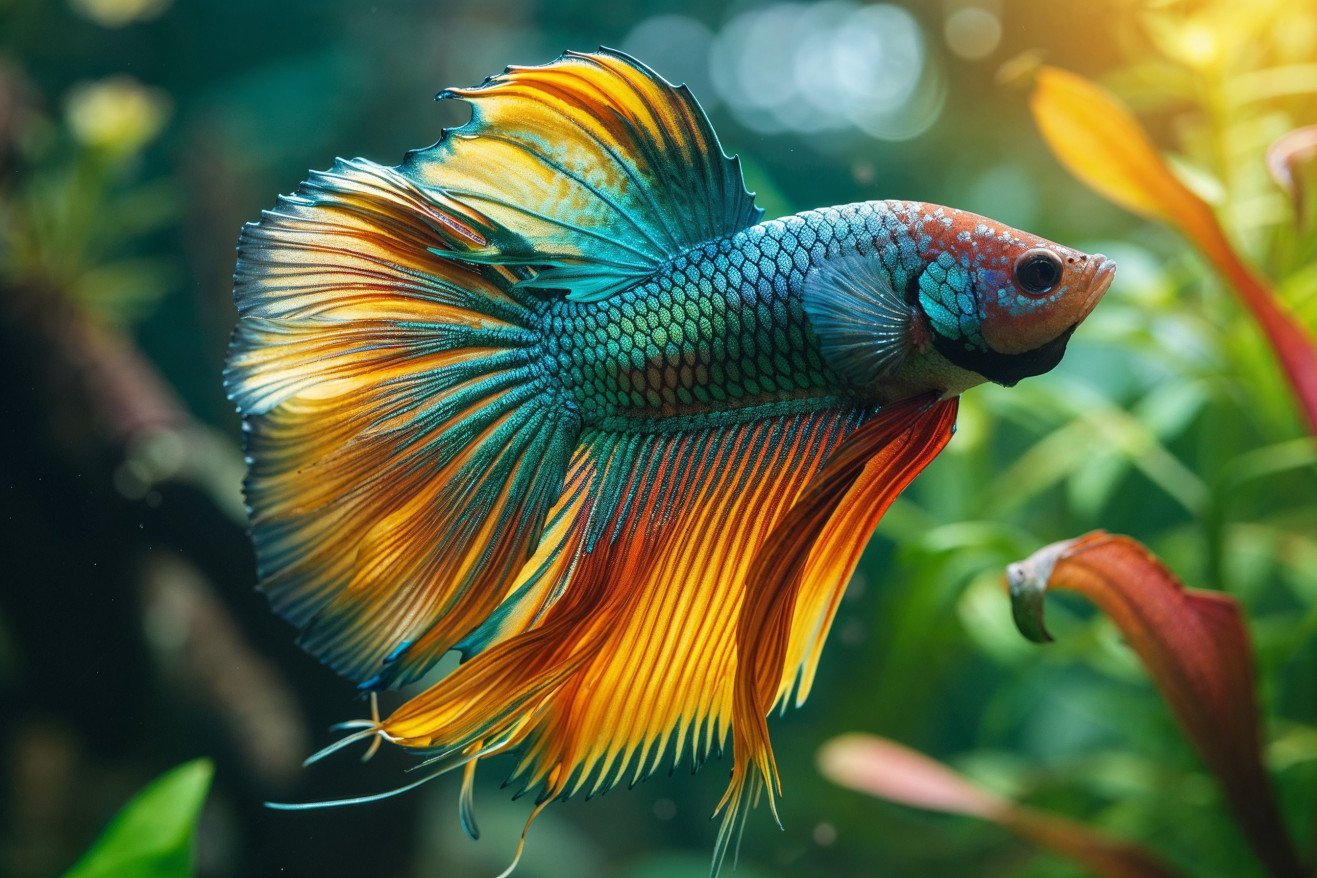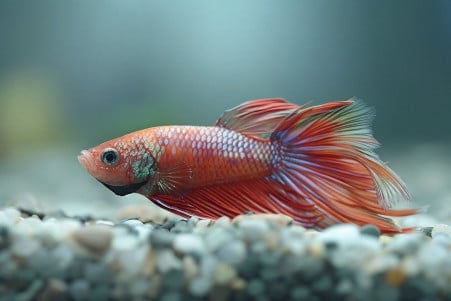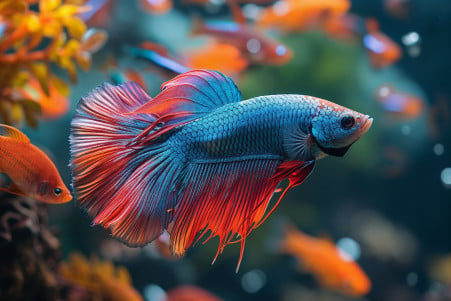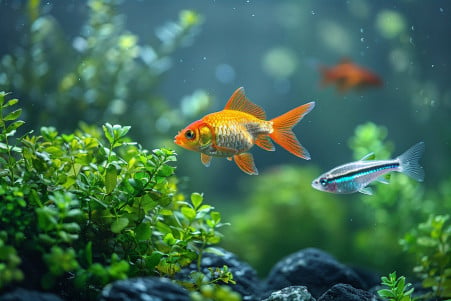Do Fish in Aquariums Get Bored or Depressed? Introducing Fish Welfare
29 January 2024

When you look into an aquarium, you may see more than just water. You may also see boredom and depression. Research has shown that fish are capable of experiencing emotions like boredom and depression, especially when they are kept in environments that don’t provide enough stimulation. Fish welfare can be improved by providing environmental enrichment and larger, more complex habitats, which can reduce distress and increase cognitive engagement.
This article will take a deep dive into the world of fish psychology, drawing on interdisciplinary research that brings together the fields of ethology, cognitive science, and veterinary medicine.
By looking at both behavioral research and environmental assessments, we can learn about fish’s cognitive abilities, including their potential to experience complex emotions, and how these abilities are impacted by captivity. This will give us a more complete picture of fish welfare and mental health in aquariums.
Can fish in a tank get bored or depressed?
Going Deeper into Fish Sentience and Emotions
The idea of fish sentience has come a long way, and there is now a wealth of scientific evidence that supports the idea that fish have rich emotional lives.
A paper published in the journal Animals even summarized the cognitive abilities of fish, many of which were once thought to be unique to mammals and birds.
This increased interest in the topic has led to a better understanding of the ways that fish can experience emotions like pain, depression, and anxiety, as shown in a comprehensive review published in the journal PMC.
This knowledge of their cognitive abilities also leads to ethical questions about how fish are treated and cared for in captivity.
Not only is it important to make sure that the environments fish are kept in are conducive to their emotional well-being, it’s also an ethical responsibility.
As the journal Animal Cognition notes in a summary of recent research that calls for ecologically relevant experiments, it’s time to think about how we can change our practices to better support the well-being of these animals.
The increased understanding of fish emotionality also leads to questions about how the environments fish are kept in may impact their mental states, an area that needs more research.
Building a Better Home: The Importance of Tank Environment for Fish Welfare
The environment of the tank is one of the most important factors in determining the welfare of the fish that live in it. Fish behavior and stress are directly impacted by the environment in which they live, according to Fish and Fisheries.
Naslund’s study shows that the inclusion of structural environmental enrichment in tanks leads to a significant improvement in fish welfare. A study in PMC found that the introduction of physical complexities, such as plants or substrates, into the tanks led to improved growth rates and reduced aggression, both of which are positively correlated with fish welfare.
Yet, the type of enrichment matters as much as the introduction of new elements into the tank. For example, a study in ScienceDirect found that group size and environmental complexity both impacted foraging activity and aggression levels. Smaller groups may show increased foraging activity in highly enriched tanks, which is a sign of healthy, stimulated fish.
These findings show that tank size, environmental complexity, and appropriate social grouping are all important in ensuring cognitive stimulation and reducing stress. As a result, it’s important for fish owners to ensure that the environment they create for their fish in their tanks is enriched in a way that meets the natural behaviors and requirements of their specific species.
In doing so, fish owners can create a more stimulating and supportive environment that helps fish not only survive but thrive.
Inside the Fish Mind: Cognitive Abilities and Emotions
The cognitive world of fish has been historically overlooked, but new studies are starting to reveal the depths of their mental lives. For example, a study in PLOS Biology by Alexander Kotrschal demonstrated that environmental changes can lead to increased cognitive abilities in fish.
The study found that cichlids that were given different amounts of food learned better than those that were given a consistent amount of food, regardless of the amount. This suggests that cognitive development is tied to the ability to adapt to changing environments, which in turn suggests that fish may have complex emotional lives.
This idea is supported by a study in ScienceDirect by Redouan Bshary, which looks at the evolutionary implications of fish intelligence. Bshary’s research shows that fish are in a unique position on the vertebrate phylogenetic tree, and that they share a common ancestor with tetrapods. This means that vertebrates, including humans, may have inherited complex brain functions from their common ancestors with fish.
While these studies show that fish have advanced learning, memory, and social skills, they also warn against assuming that these abilities mean that fish have human-like emotions.
Fish have a unique evolutionary history that has led to their cognitive abilities, and their behavior can only be understood in the context of their specific ecological and physiological circumstances.
However, these studies show that fish are more intelligent and have more complex cognitive lives than we’ve traditionally given them credit for. This has important implications for the way we treat fish in captivity, and suggests that we need to make sure that the environments we keep fish in are stimulating and support their mental health.
Mental Stimulation: Why Enrichment Is Important in Aquariums
Environmental enrichment in fish tanks involves increasing the complexity of the environment, replicating natural elements, and meeting the psychological and physiological needs of the fish. Research in Animals and PMC has shown that environmental enrichment can have a profound effect on fish behavior and welfare.
For example, Octopus vulgaris in enriched environments have been shown to display more active and diverse behaviors, which indicates a higher level of well-being than those in unenriched environments. Meanwhile, Clarias gariepinus in tanks with environmental enrichments like plants and substrates have been shown to have better growth rates and lower aggression.
Enrichment can come in many forms, including physical items like plants and caves, cognitive challenges like interactive toys, and social interactions that are appropriate to the species’ needs. All of these things help to reduce boredom and depressive-like states by providing opportunities for natural behaviors.
Research in ScienceDirect has shown that the effects of enrichment can be mixed, with three-spined sticklebacks not showing any differences in learning or temperament as a result of enrichment, but the overall consensus is that enrichment is beneficial.
Aquarium owners can enrich their tanks by adding a variety of plants, hiding spots, and other items that encourage exploration. In the process, they can create an environment that is stimulating and supportive of the cognitive and emotional well-being of the fish they keep. This is essential for helping to ensure that the fish in their care are happy and healthy.
On the Emotional Toll of Boredom and Depression
In the end, our deep dive into the emotional lives of fish shows that the potential for boredom and depression in fish is more than just a small blip on the radar. Research, such as the studies found in PMC, has shown that the size of a tank and its complexity directly impact fish behavior and welfare, with fish in smaller, less complex tanks showing signs of stress and decreased boldness.
This makes the role of environmental factors in fish welfare incredibly important. Enrichment items like plants, substrates, and space, which PetsRadar notes are important for fish, are critical for brain development and behavior and are therefore critical for the mental health of these animals. Ongoing research is shedding light on fish psychology and helping to ensure that aquarium management is based on evidence.
Responsible fish owners are aware of and meet the emotional needs of their fish. By recognizing that fish are sentient and creating stimulating environments that meet their needs and are similar to their natural habitats, we can help ensure that fish are treated in a more humane and ethical way in captivity.
We also need to remember that the well-being of our fish friends is in our hands and it’s our responsibility to make sure that their tanks are truly homes and not just containers.


